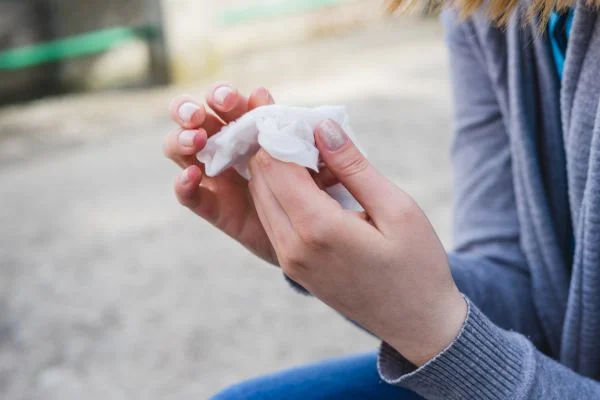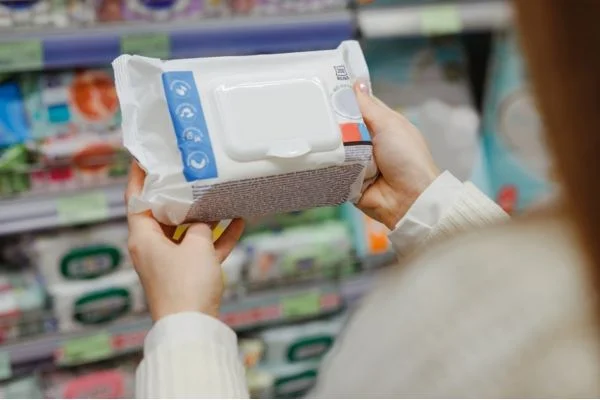If you’re a parent, chances are you’ve used baby wipes for diaper changes and other messes. But have you ever stopped considering are baby wipes biodegradable? It might surprise you that the answer is not as straightforward as you think.
Not all baby wipes are biodegradable. Some brands offer biodegradable options, but many traditional ones contain non-biodegradable materials, harming the environment. Always check product labels.
Are Baby Wipes Biodegradable?
The short answer to this question is yes, some baby wipes are biodegradable—but not all of them. The critical difference between biodegradable and non-biodegradable baby wipes is the type of material they’re made from.
Non-biodegradable baby wipes are typically made from synthetic materials such as polyester and plastic, which means they won’t break down in landfills or compost piles.
On the other hand, biodegradable baby wipes are usually made from natural materials like cotton or bamboo fibers, which will eventually break down over time.
Another factor affecting baby wipes’ biodegradability is the ingredients used in their manufacture. Many conventional baby wipes contain harsh chemicals such as alcohol and preservatives that don’t break down quickly.
As such, it’s essential to read labels carefully when buying baby wipes to ensure they don’t contain any potentially harmful ingredients.
Finally, it’s essential to remember that even if a wipe is labeled as “biodegradable,” it may still take several years to decompose completely, depending on its composition and environmental conditions.
In addition, some types of plastic can be harder to break down than others, so even so-called “biodegradable” plastic bags may take longer than expected to degrade fully.
Also Read: Do Baby Wipes Kill Germs?
How Long Does It Take A Baby Wipe To Decompose?

Baby wipes may seem like a harmless and convenient product, but many of them pose a significant environmental issue. With their capability to still be used after each use, many see them as an affordable and efficient way of cleaning up messes.
However, due to the materials that comprise their thin layers, such as plastic and wood pulp, it might surprise you to learn that baby wipes can take years to decompose. Many companies’ sustainable alternative relies on natural fibers like bamboo or hemp that are biodegradable and can break down faster.
However, most commercial brands contain synthetic materials to keep costs low. Therefore, discovering how long a baby wipe takes to decompose requires knowledge of what is included within the wipe itself. Unfortunately, most manufacturers do not input this information on the product label.
Also Read: What Happens If You Flush Baby Wipes?
Are Baby Wipes Safe For The Environment?
We all like convenience, and baby wipes provide that in spades. But what about the environment? Many of us don’t realize that certain types of baby wipes can be bad for the environment. In this section, we’ll examine why some baby wipes may be unsafe for the environment and what you can do to ensure you are making eco-friendly choices.
What is Baby Wipes Made Of?
Baby wipes are made of several materials, such as cotton, polyester, rayon, wood pulp, and water. Most notably, they usually contain chemicals that help keep them moist and prevent them from drying out too quickly.
Unfortunately, many of these chemicals are toxic to the environment and can cause damage to local wildlife and ecosystems if they get into our waterways.
The Problem with “Flushable” Baby Wipes
Many believe that “flushable” baby wipes are safe for the environment because they break down faster than other types of waste.
While it is true that flushable wipes do break down more quickly than non-flushable ones, they still contain a variety of harmful chemicals that can damage the environment if not disposed of properly.
In addition, these wipes often clog pipes when flushed down toilets or sinks, which leads to costly plumbing repairs.
Making Eco-Friendly Choices
The good news is that plenty of eco-friendly alternatives are available on the market today! Many brands offer organic or biodegradable baby wipes made from natural materials such as bamboo or cotton, which have been sustainably sourced.
These products are also free from harsh chemicals, so you don’t have to worry about them damaging local ecosystems when disposed of properly. Additionally, by opting for reusable clothes instead of disposable ones, you can reduce your environmental impact even further!
Also Read: How To Treat Allergic Reaction To Baby Wipes?
Bottom Line:
So are baby wipes biodegradable?, while some baby wipes can be biodegradable, not all are created equal. When shopping for baby wipes, look for those made from natural materials like cotton or bamboo fibers and check labels for harsh chemicals that could impede their decomposition rate.
Additionally, remember that even if a wipe is labeled as “biodegradable,” it may still take several years to fully decompose, depending on its specific composition and environmental conditions.
Ultimately, reducing your overall usage of disposable items such as single-use plastics whenever possible is always the best way to reduce your ecological impact, no matter what product you use!



